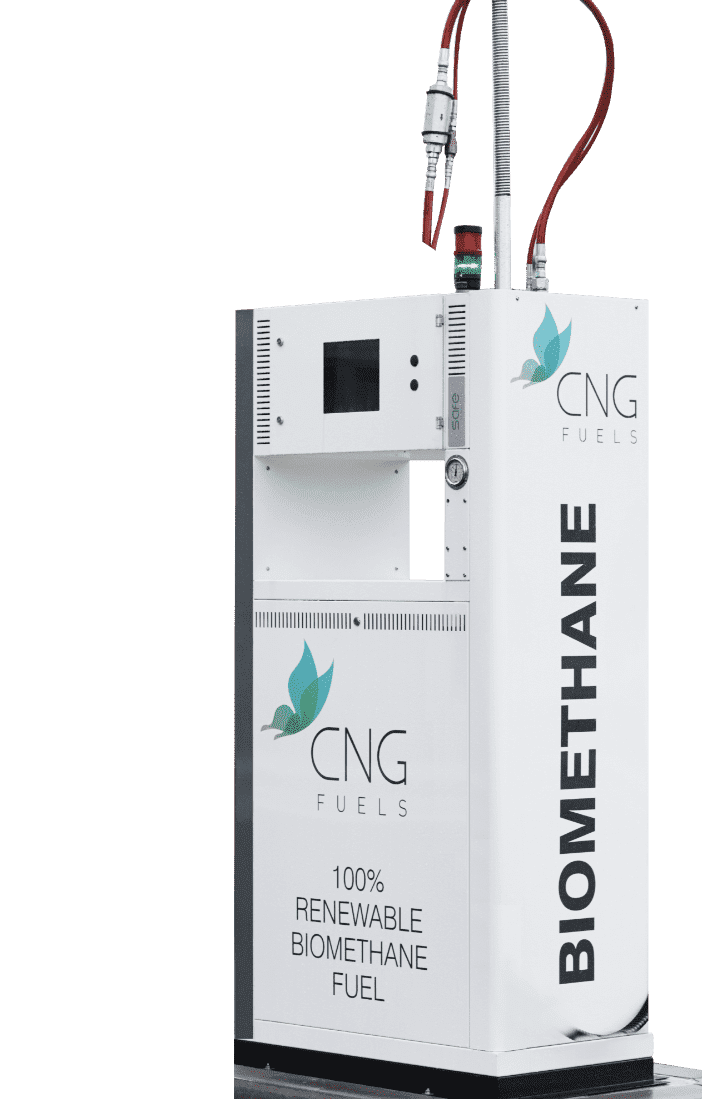Questions about cost
CNG Fuels 100% Renewable Biomethane can be up to 40% cheaper than diesel.
In the current market CNG Trucks are marginally more expensive than their diesel equivalents. However expected fuel cost savings by using CNG Fuels’ biomethane generally make up for this vehicle premium within the first year or so of operation (depending on vehicle mileage).
Currently CNG Fuels is not aware of available grant funding for the purchase of CNG vehicles. We do encourage you to speak to your local dealers and government representatives.
Questions about vehicles and stations
A CNG Fuels CNG station is made up of a pipeline that is connected to a nearby gas distribution pipeline system and compressors that draw gas out of the gas pipeline. Once compressed, the gas is stored in ground storage modules before being dispensed into vehicles.
No, CNG Fuels’ refuelling stations do not process anything on site. Natural gas is drawn out of a pipeline and compressed, without adding or removing anything from it. In the unlikely event there is a leak on site, the natural gas (which is lighter than air) would quickly rise and dissipate into the air. It would not cause any ground contamination.
CNG Fuels currently operates 13 public access stations in the UK. CNG Fuels is rolling out a network of these stations across the UK
CNG Fuels is pro alternate technologies (including electric) but for trucks the technology does not exist – weight, range, and recharging ability means that there is no electric option for HGVs. We would encourage you to speak to us directly if you have specific questions.
No, CNG Fuels has customers with fleets in the hundreds and also customers who run a couple of vehicles.
This depends on the size of the station but CNG Fuels aims to enable up to 500 trucks a day to refuel at our stations.
No, CNG Fuels does not create but sources the Bio-CNG for its refuelling stations. CNG Fuels therefore maintains relationships with a number of biomethane providers to ensure there is always enough CNG for its stations.
To refuel an HGV with 500 mile range takes approximately 5-7 minutes.
No. Original Equipment Manufacturers (OEMs) produce a range of dedicated gas vehicles that are available for purchase with no aftermarket alterations needed.
Questions about Compressed Natural Gas (CNG)
i. Bio-CNG supplied by CNG Fuels is sustainable and renewable gas that has been produced from waste feedstocks such as food waste and sewage sludge. The renewable gas production industry is a rapidly expanding industry in the UK.
ii. The target market for CNG Fuels’ Bio-CNG station is the Heavy Goods Vehicle (HGV) fleet, where an increasing number of fleets are looking to replace diesel HGVs with HGVs that run on sustainable and renewable Bio-CNG.
iii. Bio-CNG reduces a vehicle’s CO2 equivalent emissions by as much as 84%, NOx emissions by as much as 75% and noise by approx. 50% compared to a diesel vehicle
No
Drivers of CNG trucks are very happy with the technology:
i. The vehicles are 50% quieter than diesel equivalents.
ii. Refuelling is clean with no need to wear protective clothing or worry about spillage of fuel.
iii. Refuelling is simple – drivers can go about paperwork while the truck refuels.
Yes, please see “Isn’t CNG a dangerous fuel?"
CNG is lighter than air, which means that in the unlikely event there is a leak, then fuel would quickly rise and dissipate into the air. Petrol or diesel can cause pools on the ground in the event a leak occurs on a vehicle, which increases the risk of potential fires compared to CNG.








